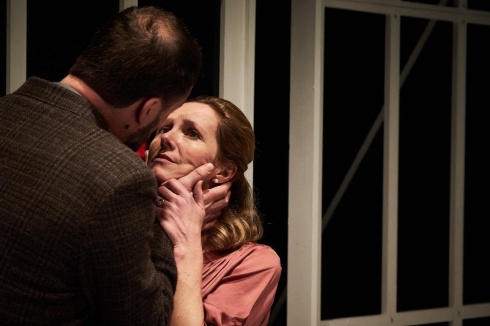Betrayal, Wilbury Theatre Group, Providence, through February 17. (401-400-7100 or info@the wilburygroup.org)
Cabaret, Roundabout Theater national tour presented by Broadway in Boston at Opera House, through February 12. (800-982-2787 or BroadwayinBoston.com)
By Jules Becker
Harold Pinter may have been a secular Sephardic British Jew, but his 1978 drama “Betrayal” bears what could be called a Talmudic sensibility. Set in England and Italy over the course of nine years (1978-1969), this three-character play employs reverse chronology to understand the origins of the love affair between Emma – married to publisher Robert – and her husband’s literary agent/best friend Jerry – also married. Quite simply, the Talmud puts top premium on questions, and so it goes with this beguiling play. Under Aubrey Snowden’s taut direction for the Wilbury Theatre Group, the mysteries and ambiguities of Pinter’s singular play have a richly dark presence all their own.
Inspired by Pinter’s own love affair with married BBC reporter Joan Bakewell and his close friendship with her BBC producer husband Michael, “Betrayal” begins by questioning how Emma and Jerry’s relationship started yet ultimately also looks into other aspects of the play’s title – among them Robert’s own infidelity and the possibility that Jerry’s wife, Judith, might have been unfaithful as well.
The swinging French doors of Josh Christofferson’s spare but elegant set become a metaphor complementing the shifting perspectives of Pinter’s intriguing drama. There are romantic passages demonstrating the home-like Italian residence where Jerry and Emma rendezvous. Even so, a striking scene in which Robert speaks briefly of liking Jerry more than her and talks vividly about playing squash and showering in an ambiance without women suggests that Robert could be bisexual and emotionally attracted to Jerry himself. Ultimately never justifying betrayals of any kind, Pinter’s dense 90-minute, no intermission play proves as arresting as its unsparing observations.
The Wilbury cast is as strong as any this critic has seen. Tanya Anderson has Emma’s allure as well as her elusiveness – especial during her telling confrontation with Robert and changing feelings for Jerry. David Tessier brings pathos to Jerry’s fond remembrance of paternal-like feeling for Emma’s daughter. Tom Chace catches Robert’s alternating warmth and distance with both his wife and his best friend. Tessier and Chace make the affection between Robert and Jerry as palpable as the tensions in their exchanges. Stuart Wilson has his cocky moments as Waiter.
Robert regrets not playing more squash with Jerry. By contrast, Pinter’s riveting play scores championship volleys in Wilbury Theatre Group’s smartly intimate revival.
* * * *
“Welcome to ‘Cabaret,’ ” the enigmatic master of ceremonies beckons at the start of the landmark Weimer Germany-set. The John Kander-Fred Ebb musical, and the Roundabout Theatre Company national tour at Boston’s Opera House is equally disarming.
![Randy Harrison as Emcee and the national tour of Roundabout Theatre Company’s 'Cabaret.' [Photo: Joan Marcus]](https://bostontheater.files.wordpress.com/2017/02/jules-cabaret.jpg?w=574&h=382)
Randy Harrison as Emcee and the national tour of Roundabout Theatre Company’s ‘Cabaret.’ [Photo: Joan Marcus]
The leads in the solid tour cast do full justice to their divergently reacting characters in Joe Masteroff’s strong book. Harrison has all of the Emcee’s early hedonism as well as his seeming collaborationist attitude and later vulnerability and sings vibrantly, particularly on the ironic solo “I don’t Care Much.” Andrea Goss brings an impressive belt to the famed title number and growing concern to apolitical Sally Bowles. Benjamin Earley has the right passion and anti-Nazi rage as bi-sexual American novelist Clifford Bradshaw. Mary Gordon Murray catches Fraulein Schneider’s survivalist instincts, and Scott Robertson has Jewish fruit seller Herr Schultz’ deluded feeling of security as a German citizen. Both Murray and Robertson sing with fine phrasing and great heart
As anti-Semitism and other forms of hatred wax more virulent around the world, the powerful musical warnings of “Cabaret” resonate with new timeliness at the Opera House.

